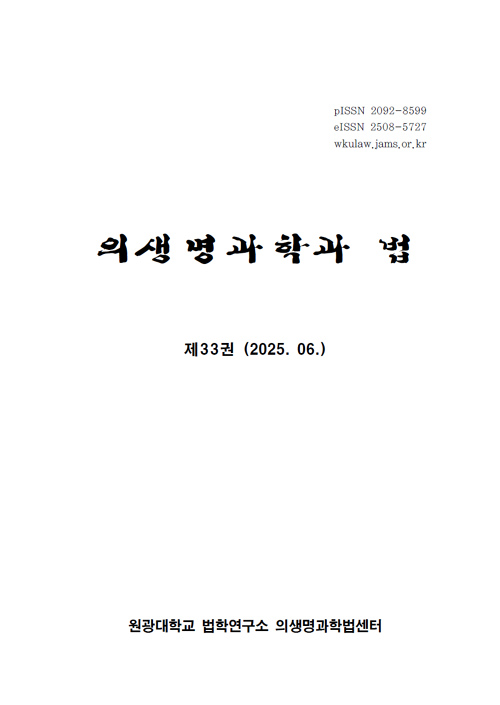- 영문명
- Possibility of Harmony between Intellectual Property Rights Related To Seeds and Seed Rights
- 발행기관
- 원광대학교 법학연구소(의생명과학법센터)
- 저자명
- 김은진(Eun-Jin Kim)
- 간행물 정보
- 『의생명과학과 법』제33권, 183~213쪽, 전체 31쪽
- 주제분류
- 법학 > 민법
- 파일형태
- 발행일자
- 2025.06.30
6,520원
구매일시로부터 72시간 이내에 다운로드 가능합니다.
이 학술논문 정보는 (주)교보문고와 각 발행기관 사이에 저작물 이용 계약이 체결된 것으로, 교보문고를 통해 제공되고 있습니다.

국문 초록
1980년대 이후 생물체에 대한 독점이 법제도화하기 시작하였고 1995년 WTO의 출범과 함께 TRIPs 협정은 이를 전세계에 의무화하였다. 농산물 수입개방에 발맞춰 종자에 대한 독점도 강화하고 특허와 식물신품종보호제도가 법제화하기 시작하였다.
과거에는 없었던 유전자변형종자들이 특허와 함께 확산되고, 새로운 품종들이 식물신품종으로 보호를 받으면서 세계는 종자전쟁에 돌입하였다. 농생명공학기업들은 지식재산권을 중심으로 자신들이 개발한 종자를 독점함으로써 경제적 이익을 도모하기 시작하였다. 관행적으로 종자를 받아서 이듬해에 심어온 농민들은 이런 독점체계에서 독점권 침해에 의한 소송으로 종자에 대한 권리를 잃어버렸다. 그 결과 도하개발아젠다가 시작할 즈음에는 농생명공학기업과 그들이 포진한 선진국과, 농민들과 그들이 보존해왔던 유전자원이 풍부한 개발도상국들 사이에 갈등으로 나타났다. 그 해결방안으로서 농부권, 농민의 권리로서의 종자권에 대한 요구가 높아졌다.
농생명공학기업들은 자신들의 권리 보호를 위하여 기술사용계약서의 의무화, 특허와 식물신품종보호제도를 통해 농민들의 종자판매를 제한하고 있다. 그러나 일반적인 공산품과는 달리 생물체의 자기복제라는 특성을 계약이나 특허 등을 통해 한 기업의 권리로 일방적으로 정하는 것에 대한 반발도 커지고 있다.
이를 해결하기 위해서는 농부권을 다른 지식재산권과 유사하게 제도적으로 보장할 방안이 필요하다. 본 논문에서는 이런 제도적 보장에 앞서 기존의 법제도 하에서 농부권을 보장, 농민의 종자판매 허용의 단초를 마련해보고자 하였다. 오픈소스, 종자의 자기복제 특성을 근거로 하는 지식재산권의 권리소진이론의 확대 등이 이런 단초로서 역할을 할 수 있기를 기대한다.
영문 초록
Monopolies on living organisms have begun to be institutionalized in law since the 1980s, and with the launch of the WTO in 1995, the TRIPs Agreement made this mandatory worldwide. In line with the agricultural products import opening, monopolies on seeds have also been strengthened, and patents and systems of protecting new varieties of plants have begun to be legislated.
As genetically modified seeds that did not exist in the past were spread along with patents, and new varieties were protected as new variety plants, the world entered a seed war. Agrobiotechnology companies began to seek economic benefits by monopolizing the seeds they developed backed by intellectual property rights. Farmers who had customarily received seeds and planted them the following year lost their rights to seeds in this monopoly system due to lawsuits for infringement of monopoly rights. As a result, by the time the Doha Development Agenda began, conflicts arose between agricultural biotechnology companies and the developed countries they were in, and farmers and developing countries rich in genetic resources that they had preserved. As a solution, demands for seed rights as farmers’ rights and farmers’ rights grew.
In order to protect their rights, agricultural biotechnology companies are restricting farmers’ seed sales through mandatory technology use contracts, patents, and new plant variety protection systems. However, there is growing opposition to unilaterally setting the self-replication characteristics of organisms, unlike general industrial products, as the rights of a single company through contracts or patents.
In order to solve this, a plan is needed to institutionally guarantee farmers' rights similar to other intellectual property rights. In this paper, we attempted to secure farmers' rights under the existing legal system and provide a starting point for allowing farmers to sell seeds before such institutional guarantees. I hope that open source and the expansion of the exhaustion theory of intellectual property rights based on the self-replicating characteristics of seeds can serve as a starting point for this.
목차
Ⅰ. 들어가며
Ⅱ. 종자관련 권리의 국제 동향
Ⅲ. 우리나라의 종자관련 법제
Ⅳ. 지식재산권 관련 종자판매제한
Ⅴ. 권리로서의 농부권 보장 방안
Ⅵ. 나가면서
참고문헌
키워드
해당간행물 수록 논문
- 의생명과학과 법 제33권 목차
- 일본 장기이식법상 아동학대 확인절차와 개인정보제공 실무에 관한 연구
- Research on Contract Dispute Resolution of Chinese Frozen Embryo Companies
- 중국 성인 정신장애인의 의료자기결정권에 관한 고찰
- 종자관련 지식재산권과 종자권의 조화가능성
- 의료분쟁 대응을 위한 ‘사과법’ 제도 설계와책임 구조의 재구성
- Pet supplements, Growing Consumer Demand, and The Need for a Regulatory Guideline
- 중국 의료인공지능 알고리즘의 윤리심사 및 책임규제에 관한 고찰
참고문헌
- 소비자법연구
- 특허청 연구보고서
- 사회과학연구
- 경영법률
- 경영법률
- 아주법학
- 예술인문사회 융합 멀티미디어 논문지
- 법문사
- 나남
- 이상북스
- 박영사
- 법문사
- 기업법연구
- 법학논집
- Duke J. Const. L. & Pub. Pol'y Sidebar
- B.C. L. Rev.
- Drake J. Agric. L.
- Lewis & Clark L. Rev.
- Social Policy & Administration
- Md. B.J.
- Fordham L. Rev.
- Berkeley Tech. L.J.
- Wake Forest Intell. Prop. L.J.
- Santa Clara Computer & High Tech. L. J.
관련논문
법학 > 민법분야 BEST
- AI 학습데이터 무단 사용에 대한 저작권 보호 방안
- 생성형 AI와 저작권 문제 - 저작권 침해와 저작물성의 사례와 분석
- 생성형 인공지능 시대, 저작권의 패러다임은 바뀌어야 하나? - 저작권-인공지능 논의에 관한 비판적 검토
법학 > 민법분야 NEW
- 청렴사회를 위한 이재명정부의 역할: 반부패·청렴의 미래 어떻게 설계할 것인가?
- AX 전환 정보보호 가이드 프레임워크에 관한 연구: 대학교육기관 적용 공정성 확립을 중심으로
- Revisiting the relationship between Corruption and Economic Growth : Cases and Theoretical Framework
최근 이용한 논문
교보eBook 첫 방문을 환영 합니다!

신규가입 혜택 지급이 완료 되었습니다.
바로 사용 가능한 교보e캐시 1,000원 (유효기간 7일)
지금 바로 교보eBook의 다양한 콘텐츠를 이용해 보세요!



